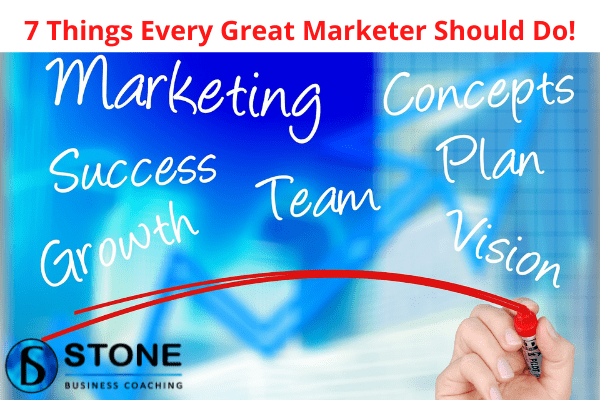When it comes to marketing your business, there are many things we should all be doing, but here is a list of the most critical 7 things that I believe that a great marketing person should be doing.
7 Great Marketing Tips
1. Know who is who and what is what
Before you can even begin selling something, you really need to know the product (or service). That is the ‘what’ you are actually selling. What are its benefits, what problem does it solve? Why does your potential client or customer really need it?
Next comes the who. Who is your ideal client? What do they value? What are their specific demographics (age, location, needs, wants etc) and where do they hang out? You should know this because you’re essentially going to stalk them. Now, don’t worry, I don’t mean stalking as in trailing them to their house or pestering them, but I do mean digitally following them. Everyone goes online to look for a pair of shoes or book an airline ticket to Melbourne? Suddenly every ad out there is about shoes or airfares to Melbourne. You are essentially being digitally stalked because you (a) meet the parameters of the advertiser and (b) you expressed an interest in the product they are selling.
The other ‘who’ is who are your competitors? How are they promoting themselves or their products? What are their keywords? How do they rank and what do they rank best on? What are their specials, offers, deals or terms? You might not be interested in what your competitor is doing, but your clients and customers will be checking them out and comparing you to them, so it’s good to know what they are seeing.
2. Develop a strategy
A marketing strategy can be relatively simple or very complicated, depending on the business, size and what is required. Your strategy might be to focus on the customer experience, or perhaps to target a certain (hopefully high margin) product. You might want to focus on a particular service or even a particular client segment. Potentially your marketing might be based on relationships or being based on perhaps scarcity. Don’t forget when you’re developing strategy the “5 P’s of Marketing”, which are Product, Price, Promotion, Place, and People. However, in my book “Magnificent Marketing” I disclose a 6th P.
3. Build a plan
Once you have your strategy, now it’s time to build the plan. This will incorporate the actual marketing activities, the channels you will use, schedule/frequency as well as budget and who will be doing the task. Your channels could include Facebook, a website landing page, LinkedIn, email marketing, advertising, Instagram Ads, flyers, letterbox drops and many, many more things. What you do want to ensure is that your plan has a good degree of variety and doesn’t just put all your eggs in one basket.
 ‘
‘
4. Ensure the plan is SMARTER
When I talk about goal setting, I talk about SMARTER goals and this also applies to your marketing goals and strategies as well. A goal (including a marketing goal or plan) should encompass:
SPECIFIC – be clear and specific about what you are doing and how
MEASURABLE – ensure you have the means to track success
ACHIEVABLE – make sure that your marketing goal (and action steps) can be done
RELEVANT – let’s do actions which are relevant for your business and industry
TIME – everything we do must be time driven; when will each action step be done?
Now I add my own two elements:
E – is for emotion. There is little point in listing an action which you hate and simply won’t get done. I speak to some business owners who hate networking, so why add this to the plan?
R – is for resources. We need to ensure you have the skill, ability, time and money to follow through on the marketing strategy. TV advertising might be awesome for you, but it might be well out of your budget. Likewise, if you’re selling $500K homes, then a budget of $20 a week just won’t cut it.
5. Implement!
I know, it sounds somewhat obvious, but there have been a number of times when my coaching clients have had all good intentions, but just don’t get around to doing their marketing. It might be a case of forgetting (or my favourite) running out of time. Sometimes inconsistency occurs and when this happens it starts that roller coaster ride where you are up and down with the level of work you have, rather than a nice even pace of work. If marketing or digital or even Google Adwords is not your thing, then outsource. Find someone who can do it well and get them to do it, rather than wasting a tonne of money or time doing it wrong.
6. Track what works – analytics etc
Particularly with digital marketing, we have so many resources at our hands. We can attain reports, analytics and many real-time metrics to tell us what is working or not. Many of these metrics and resources are free; so there is no excuse to not be accessing them. Even if marketing isn’t your strong suit, learn how to read and use these metrics in order to know what is working best. If you are using a marketer for a specific task, perhaps Facebook, Google Ads or SEO (Search Engine Optimisation), then you will most likely receive a report from that professional. Be sure to read it and if you don’t understand something then ask. Asking and reading are some of the best ways to expand your knowledge and understanding.
7. Rinse & repeat
The concept of ‘rinse and repeat’ is generally around continual repetition of a sequence of events or an action. It is about predictability, but it’s also about consistency. Perhaps if we call this ‘Rinse, Adjust & Repeat’ it might be more suitable. If something is working, you rinse it off and it may not need to be adjusted much at all, just repeated. If something didn’t work so well, then (aha the value of the analytics I mentioned above) you tweak and then proceed. If it was shocking and it’s not about how you did it, but more that it was the wrong choice, then you won’t be repeating it. Even things that worked well before, won’t always work well in the future. You’ve got to be constantly reviewing (analyzing) and then repeating. You must repeat, otherwise, you’ll soon find you have all the time in the world because you have very little work coming in.
When it comes to marketing there are many aspects you need to consider. Are you sending the right message to the right person? Is your branding putting your best foot forward, or is it letting you down? Does your content equate to words that tell, sell and compel? Are your headers ones that rock and encourage people to open an email, or to continue reading your website content?
When it comes to business coaching, I can guide you on how to sell well to your clients, how to look after them, how to make a good income, track the money, keep the systems working, but without marketing (and clients/customers) then we won’t have a lot to talk about. That is why a good portion of my coaching (particularly where a business wants to increase in size) focus on marketing and sales. Plus we should never forget about customer retention and upselling. But first, get the marketing right and get the business in the door! If you’d like any help with implementing a marketing strategy, plan, sales training or general business coaching, then talk to me. My passion is your potential!






